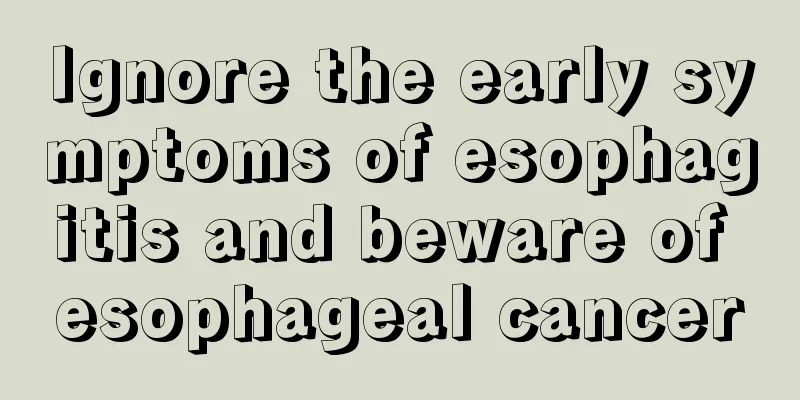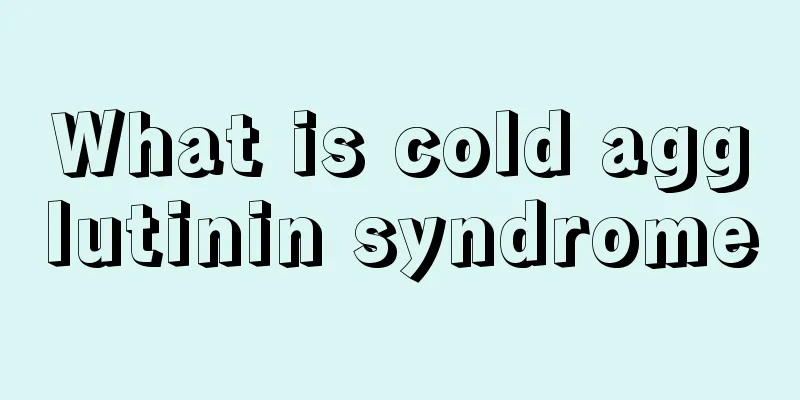Ignore the early symptoms of esophagitis and beware of esophageal cancer

|
What is esophagitis? Esophagitis is a chemical inflammation caused by gastric acid reflux into the esophagus. The main clinical manifestations are: heartburn and burning and pain behind the sternum. In severe cases, aspiration tracheitis or pneumonia may occur, and even ulcer bleeding may endanger life. Therefore, in daily life, we must achieve "early detection and early treatment". So how do we know if this is esophagitis? What are its symptoms? Early symptoms of esophagitis: 1. Pain: Chest pain or back pain is one of the early symptoms of esophageal cancer. The pain is dull, burning, or stabbing, and may be accompanied by a feeling of heaviness. Chest and back pain is often caused by external invasion of the tumor, leading to esophagitis, mediastinitis, and even involving adjacent organs, nerves, and paraspinal tissues. 2. Dysphagia: In the early stage, intermittent dysphagia may occur due to secondary esophageal spasm caused by esophagitis. In the later stage, due to esophageal scarring and stricture, the burning sensation and burning pain gradually decrease and are replaced by long-term dysphagia, which may cause a feeling of blockage or pain when eating solid food. 3. Hoarseness: When the tumor directly invades or the metastatic lesions compress the recurrent laryngeal nerve, vocal cord paralysis occurs, leading to hoarseness. Hoarseness may improve in some patients with effective treatment. 4. Vomiting mucus: The esophageal changes caused by esophageal cancer lead to incomplete or complete esophageal obstruction, which makes the secretions difficult to drain and accumulate in the narrow upper part of the esophagus, stimulating esophageal retrograde peristalsis and then vomiting. 5. Acid reflux: After each meal, when lying forward or sleeping in bed at night, acidic liquid or food flows back from the stomach and esophagus to the pharynx or mouth. This symptom often occurs before the burning sensation or burning pain behind the sternum. 6. Bleeding: The amount of bleeding is related to the scope, degree and location of the mucosal tear. In severe cases, it can cause shock or even death. Especially for elderly patients, due to arteriosclerosis, ruptured blood vessels are not easy to shrink, so attention should be paid. However, most patients bleed less, and some even only have black stools without vomiting blood. 7. Severe vomiting: The typical manifestation is severe vomiting first, followed by hematemesis or black stools. Most of the time, hematemesis is painless. A small number of patients may have retrosternal or upper abdominal pain, which is usually not severe. Other early symptoms of esophageal cancer include unexplained discomfort, burning or pain behind the sternum, a foreign body sensation or friction when food passes through, and sometimes a sense of stagnation or mild obstruction in a certain part when swallowing food. Lower esophageal cancer can also cause upper abdominal discomfort, hiccups, belching, etc. Even if you are prone to choking or difficulty swallowing dry or hard food, it may be a sign of esophageal cancer. |
<<: What are tumor autoantibodies? Click here, you can find everything you want
>>: After getting cancer, will I get other cancers again?
Recommend
Causes of knee bone hyperplasia
Knee bone hyperplasia is just a type of bone hype...
What to do if you are woken up by mosquito bites in the middle of the night
In summer, mosquitoes are always rampant in swarm...
What causes the late stage symptoms of lymphoma
Lymphoma is a serious disease with a very high in...
Postpartum fear
Although being a mother is something that many wo...
Are there any taboos in growing hibiscus at home?
Hibiscus is a very beautiful plant. We can see hi...
Symptoms of E. coli infection in the lungs
E. coli infection can cause serious harm to our h...
Wake up with a dry throat
There are many people in life, whether male or fe...
Guide to nine common diseases
Those office workers who are busy with network wo...
Health products containing zinc and selenium
At present, there are many types of health produc...
What are the benefits of boiling grapefruit pulp in water?
Pomelo is a relatively large fruit and is widely ...
The difference between bladder tumor and bladder cancer
Bladder malignant tumors include two types: uroth...
What kind of plaster is good for knee pain
In traditional Chinese medicine, knee pain is mos...
The skin on the lower back turns black_What is the reason for the black skin on the lower back
People all want their skin to be fair and clean, ...
Can vinegar that has been used to soak ginger be used again?
Many people make ginger soaked in vinegar for the...
Treatment methods for 4 plus urine protein
We all know that our bodies are covered by variou...









